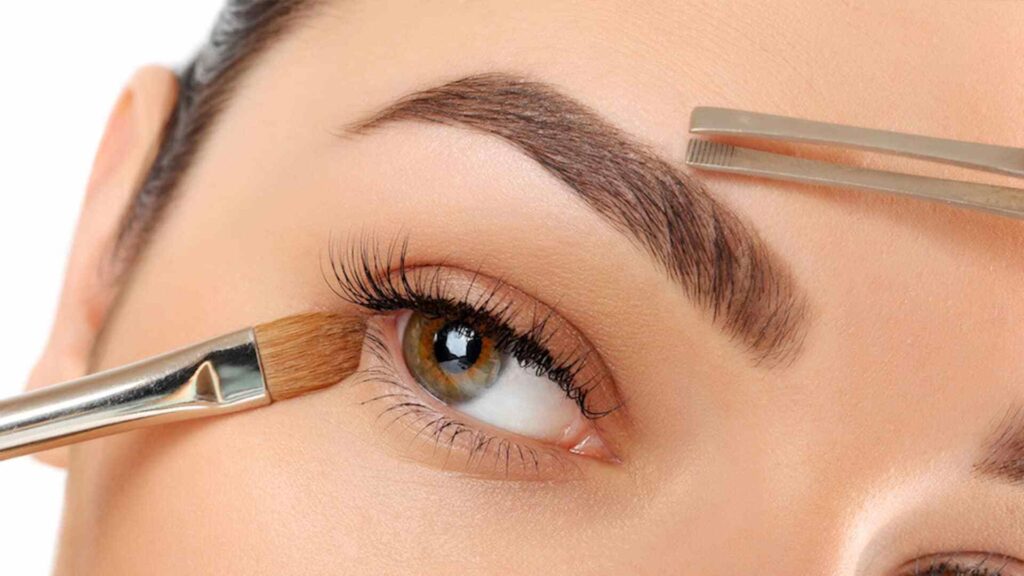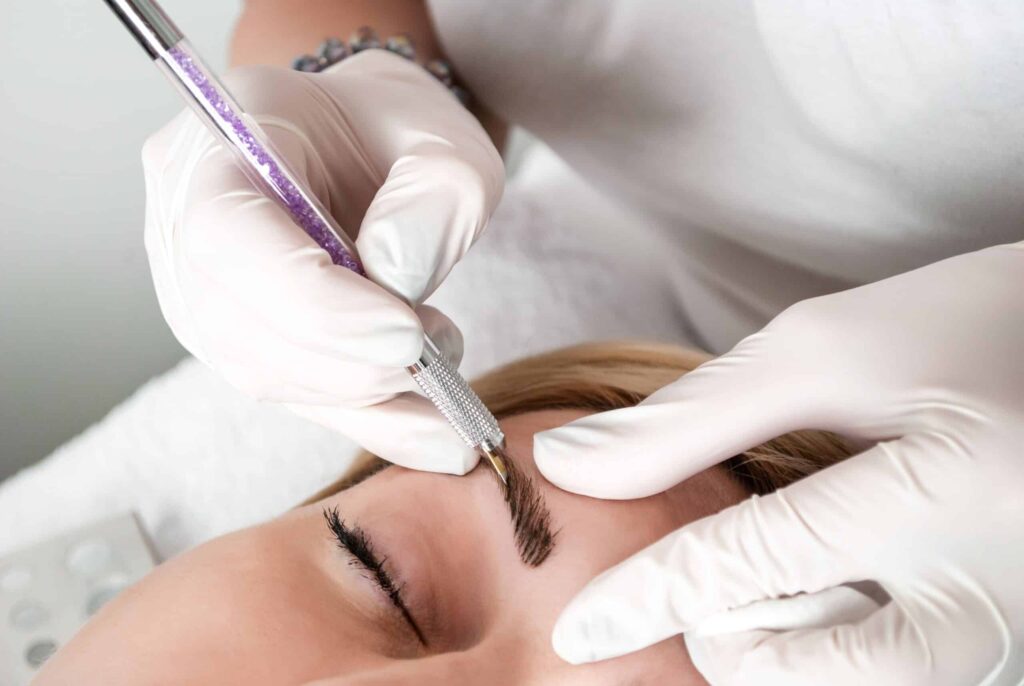Semi-permanent Makeup Eyebrow Microblading
Semi-permanent makeup eyebrow microblading is a cosmetic technique that has gained popularity in recent years for its ability to enhance the appearance of eyebrows. This procedure uses a hand-held tool with tiny needles to deposit pigment into the skin, creating fine, hair-like strokes that mimic the look of natural eyebrows. The result is a semi-permanent solution that can last up to one or two years, saving you time and effort in your daily makeup routine. This guide will outline the steps involved in the microblading procedure, including consultation, preparation, and aftercare.
The Microblading Process
Microblading is a semi-permanent makeup technique for creating fuller and more defined eyebrows. It involves using a handheld tool to manually deposit pigment into the skin, mimicking the appearance of individual hairs. The procedure typically starts with a consultation with a professional microblading artist to determine the desired shape and color. Then, the skin is numbed, and the artist uses the microblading tool to make fine incisions in the skin and deposit pigment. After the procedure, the skin must be appropriately cared for to ensure optimal healing and long-lasting results. The entire process typically takes around an hour.
Preparation For The Procedure
Before undergoing a semi-permanent makeup eyebrow microblading procedure, it is essential to prepare appropriately to ensure the best possible results. This includes discussing any medical conditions or allergies with the professional, avoiding alcohol, caffeine, and blood thinning medication for a few hours before the procedure, and avoiding sun exposure on the area to be treated. Avoiding scheduling appointments during menstruation may be advised, as this can affect skin sensitivity. It is also essential to have a clear understanding of the process, expected results, and potential risks or side effects.
Suitable Candidates For Microblading
Suitable candidates for Microblading are individuals with light or thin eyebrows who desire a fuller, more defined look. The procedure is also ideal for those with gaps in their eyebrows or over-plucked brows. However, people with certain medical conditions, such as autoimmune disorders, skin conditions, or those taking blood thinners, are not considered suitable for microblading. Individuals must discuss their medical history with a licensed professional before the procedure to ensure their safety and optimal results.
Aftercare And Healing
After the semi-permanent makeup eyebrow microblading procedure, it’s essential to follow the aftercare instructions provided by the professional to ensure proper healing and optimal results. This may include avoiding activities that can cause excessive sweating, applying a healing ointment, and avoiding exposure to water and sun for a certain period. It’s also essential to keep the area clean and avoid picking or scratching the treated area. Touch-up appointments may be recommended to maintain the desired shape and color of the eyebrows. Proper aftercare and healing will help ensure the longevity of the microblading results.
Advantages Of Microblading

Semi-permanent makeup eyebrow microblading provides several advantages for those who undergo the procedure. Firstly, it offers a natural-looking result, as the hair-like strokes mimic natural eyebrow hair. This makes it an ideal choice for those with sparse or patchy eyebrows who want to enhance their appearance.
Additionally, microblading is a semi-permanent solution, meaning the results can last for several months before needing a touch-up. This can save time and effort in the morning, as the need to fill brows with makeup is reduced. Lastly, the procedure is relatively quick and straightforward, with minimal discomfort, making it a convenient choice for those who want to achieve a fuller and more defined brow shape.
Disadvantages Of Microblading
Microblading, a form of semi-permanent makeup for eyebrows, has some disadvantages to consider before undergoing the procedure. One drawback is that the pigments used in microblading can cause allergic reactions in some individuals. Another disadvantage is that the process can be painful and requires touch-up treatments to maintain its appearance. Microblading may not be suitable for individuals with certain skin conditions, such as eczema or psoriasis. Over time, the pigments can fade and become discolored, leading to an unnatural appearance. Additionally, improper aftercare can result in infection or scarring. It’s essential to thoroughly research and choose a reputable and qualified professional for the procedure to minimize the risk of these disadvantages.
Choosing A Professional Microblading Artist
Choosing a professional microblading artist is crucial for a safe and satisfactory result. The first thing to consider is the artist’s qualifications and experience. Look for a professional with a certification in microblading and a portfolio of their work. Ask questions about their training, experience, and approach to the procedure and aftercare. Research the professional’s reputation by reading reviews and checking their online presence. It’s essential to have a consultation with the artist to discuss your expectations and ensure they are on the same page. Don’t compromise on quality or safety; make sure you feel comfortable and confident in your choice before scheduling the procedure.
Design And Shape
The design and shape of the eyebrows are crucial in the microblading procedure. A professional will first evaluate the client’s face shape, skin type, and brow hair to determine the ideal brow shape. They will then create a custom design, using a pencil or pigment, to match the client’s natural eyebrows. The design is then traced onto the skin, guiding the microblading artist to follow during the pigmentation process. The goal is to create a natural, symmetrical, flattering brow shape that complements the client’s features.
Pigmentation Process
The pigmentation process in Microblading involves using a small handheld tool with tiny needles to create hair-like strokes in the skin. The pigment is deposited in the skin’s epidermis layer, giving the appearance of fuller, more defined eyebrows. The pigment color is chosen to match the client’s natural hair color and skin tone, and the process usually takes an hour to complete. Selecting a licensed professional to minimize the risk of complications and ensure optimal results is essential.
Qualifications To Look For
When choosing a professional for a microblading procedure, it’s essential to look for specific qualifications to ensure the best results and minimize the risk of adverse effects. Firstly, the artist should have proper training and certification in microblading.

It’s also a good idea to look for an artist with a portfolio of their work and positive reviews from past clients. Additionally, the artist should use sterile equipment and follow proper health and safety protocols to reduce the risk of infection. The professional should also be transparent about their aftercare instructions and provide clear information about the potential risks and benefits of the procedure. By doing research and choosing a qualified artist, you can ensure a safe and successful microblading experience.
Questions To Ask
Before choosing a professional for your microblading procedure, asking specific questions is essential to ensure you receive the best possible outcome. Some questions to consider include their qualifications and experience, their approach to the procedure, their aftercare instructions, the type of pigment they use and any potential side effects or risks, their pricing and payment policies, and the results you can expect and how long they will last. You can also ask to see pictures of their previous work before and after. These questions can help you make an informed decision and feel confident in the professional you choose for your microblading procedure.
Importance Of Researching Before Choosing
Choosing the right professional for your microblading procedure is crucial in achieving the desired results and minimizing the risks of adverse effects. Researching before selecting a professional involves looking into their qualifications, experience, and reputation in the industry. It’s important to ask questions about their training, the type of pigments they use, and their aftercare recommendations. You can also ask for before and after photos of their previous clients to see the quality of their work. Reading reviews and testimonials from previous clients can also provide valuable insights. Researching before choosing a professional can help you receive safe and effective microblading services and avoid potential complications.
Factors Affecting The Longevity Of Microblading
The longevity of Microblading, a cosmetic tattooing procedure, can be affected by various factors, including skin type, sun exposure, skincare routine, lifestyle habits, genetics, and the quality of the pigments and tools used. The aftercare and touch-up appointments also play a crucial role in maintaining the longevity of the results. To maximize longevity, it is essential to follow the aftercare instructions provided by the practitioner, avoid sun exposure and excessive sweating, and keep the skin hydrated and moisturized.
Semi-permanent makeup eyebrow microblading effectively creates fuller, more defined eyebrows. The procedure involves using fine needles to deposit pigment into the skin, resulting in a natural, long-lasting look. The design and shape of the eyebrows are crucial and will be customized to each individual’s unique features. It’s essential to remember that, like any cosmetic procedure, there are risks and potential complications associated with microblading. Choosing a licensed professional to minimize these risks and ensure a safe, effective treatment is crucial.
If you’re interested in enhancing your brows with microblading, we encourage you to call us today or visit our website to schedule a consultation. Our team of experts will be happy to answer any questions and help you achieve your desired look.
